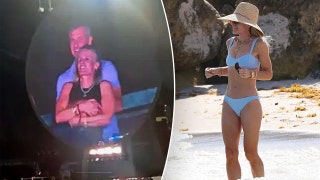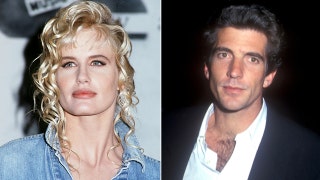Clean-cut crooner Andy Williams, whose performance of "Moon River" became a pop music classic, has died at the age of 84.
"[Williams] passed away last night (Tuesday) at home in Branson, Missouri following a year long battle with bladder cancer," his rep said in a statement to FoxNews.com.
With an easy style and a mellow voice that President Ronald Reagan once termed "a national treasure," Williams proved ideal for television. "The Andy Williams Show," which lasted in various formats from 1957 to 1971, featured Williams alternately performing his stable of easy-listening ballads and bantering casually with his guest stars.
He received 18 gold and three platinum albums over his long career and was nominated for five Grammy awards. He released an autobiography in 2009, "Moon River and Me: A Memoir."
It was on his show that Williams -- who launched his own career as part of an all-brother quartet -- introduced the world to the original four singing Osmond Brothers of Utah. Their younger sibling Donny also made his debut on Williams' show, in 1963 when he was 6 years old.
Four decades later, the Osmonds and Williams would find themselves in close proximity again, sharing Williams' theater in Branson, Mo., during the 2003 season.
The singer's unflappable manner on television and in concert mirrored his offstage demeanor.
"I guess I've never really been aggressive, although almost everybody else in show business fights and gouges and knees to get where they want to be," he once said. "My trouble is, I'm not constructed temperamentally along those lines."
Williams' clean-cut persona, which made him a popular act in conservative Branson, also carried over into his personal life. He was connected with scandal only once -- indirectly -- when his ex-wife, former Las Vegas showgirl Claudine Longet, shot her lover, skiing champion Spider Sabich, to death in 1976. The Rolling Stones mocked the tragedy in the song "Claudine."
Longet, who said it was an accident, spent only a week in jail, and Williams provided support for her and their children, Noelle, Christian and Robert.
Born in Wall Lake, Iowa, on Dec. 3, 1927, Howard Andrew Williams began performing with his older brothers Dick, Bob and Don in the local Presbyterian church choir when he was 8. Their father, a postal worker, was the choirmaster.
Soon after, the Williams Brothers Quartet landed a regular spot on Des Moines radio station WHO's Iowa Barn Dance. The show quickly brought attention from Chicago, Cincinnati and Hollywood.
They joined Bing Crosby in recording the hit "Swinging on a Star" in 1944 for Crosby's film "Going My Way," and Andy, barely a teenager, was picked to dub Lauren Bacall's voice on a song for the film "To Have and Have Not." His voice stayed in the film until the preview, when it was cut because it didn't sound like Bacall's.
Later the brothers worked with Kay Thompson, a singer who had taken a position as vocal coach at MGM studios, working with Judy Garland, June Allyson and others.
After three months of training, Thompson and the Williams Brothers broke in their show at the El Rancho Room in Las Vegas to a huge ovation. They drew rave reviews in New York, Los Angeles and across the nation, earning a peak of $25,000 a week.
Williams, analyzing their success, once said: "Somehow we managed to work up and sustain an almost unbearable pitch of speed and rhythm."
After five years, the three older brothers, who were starting their own families, had tired of the constant travel and left to pursue other careers.
Williams initially struggled as a solo act and was so broke at one point that he resorted to eating food intended for his two dogs.
"I had no money for food, so I ate it," he recalled in 2001, "and it actually was damned good."
A two-year TV stint on Steve Allen's "Tonight Show" and a contract with Cadence Records turned things around.
"The Andy Williams Show" followed, along with a host of gold albums and records. Among his hit records: "Canadian Sunset," "The Hawaiian Wedding Song," "Dear Heart," "Days of Wine and Roses," the theme from the movie "Love Story" and "Charade."
After leaving TV, Williams headed back on the road, where his many Christmas shows and albums made him a huge draw during the holidays. One year in Des Moines, however, a snowstorm kept the customers away, and the band's equipment failed to reach Chicago in time for the next night's show, forcing the musicians to borrow instruments from a high school band.
"No more tours," Williams decreed.
He decided to settle in Branson, the self-proclaimed "live entertainment capital of the country," with its dozens of theaters featuring live music, comedy and magic acts.
When he arrived in 1992, the town was dominated by country music performers, but Williams changed that, building the classy, $13 million Andy Williams Moon River Theater in the heart of the city's entertainment district and performing two shows a night, six days a week, nine months of the year. Only in recent years did he begin to cut back to one show a night.
Not surprisingly, his most popular time of the year was Christmas, although he acknowledged that not everyone in Hollywood accepted his move to the Midwest.
"The fact is most of my friends in L.A. still think I'm nuts for coming here," he told The Associated Press in 1998.
He and his second wife, the former Debbie Haas, divided their time between homes in Branson and Palm Springs, where he spent his leisure hours on the golf course when Branson's theaters were dark during the winter months following Christmas.
Retirement was not on his schedule. As he told the AP in 2001: "I'll keep going until I get to the point where I can't get out on stage."
He continued to perform even after announcing his bladder cancer diagnosis in 2011.
Williams is survived by his wife Debbie and his three children, Robert, Noelle and Christian.
In lieu of flowers, the family asks that donations be made to the Bladder Cancer Advocacy Network.
- The Associated Press contributed to this report.















































